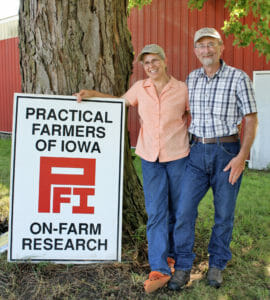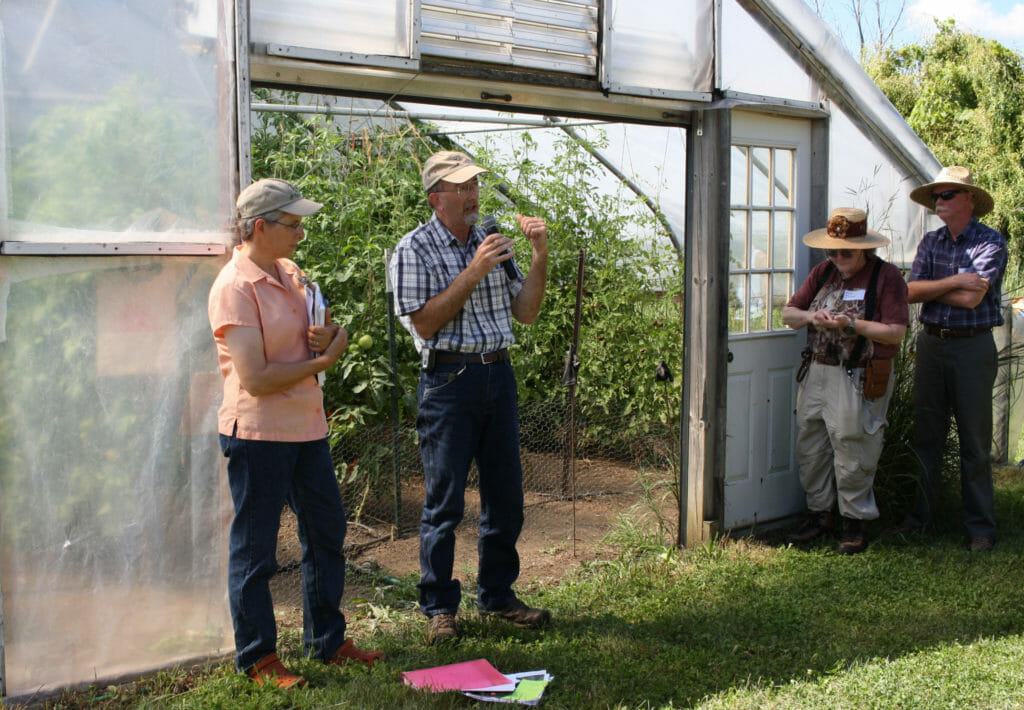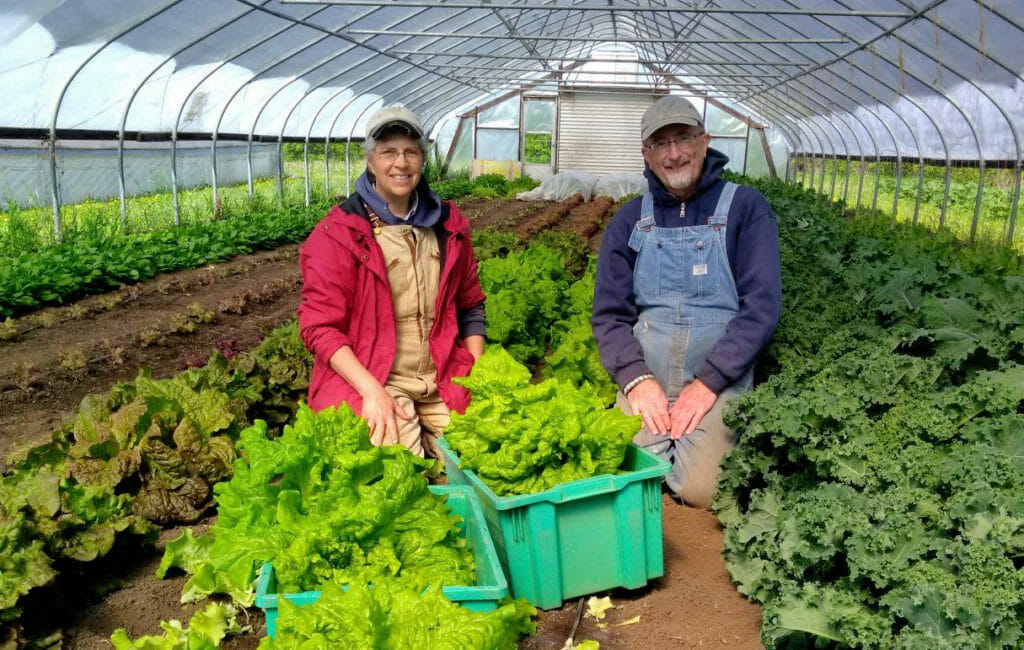Farming to Engage People and Land
For over 25 years, Jan Libbey and Tim Landgraf have helped lead and grow the local foods movement in north-central Iowa.
When lifetime PFI members Jan Libbey and Tim Landgraf started their diversified vegetable farm near Kanawha, Iowa, in the mid-1990s, they had no idea they’d become part of the leading edge of Iowa’s nascent local foods movement. Their goal was to make a positive contribution to agriculture in their community, and to connect people to land, food and each other.
Leaders and “Compassionate Activists”

Jan and Tim pose by their PFI on-farm research sign. The sign’s logo, which dates to PFI’s early days, reveals the couple’s long-time membership status.
More than 20 years later, the couple has been instrumental in efforts to strengthen north-central Iowa’s regional food system through their farm, One Step at a Time Gardens, and their ongoing work to push the local foods conversation, raise the profile of local farms and connect more people to locally raised food.
“Getting into farming,” Jan says, “was an opportunity for Tim and I to put our skills together and make an impact on rural economic development.”
Today, One Step at a Time Gardens is a 132-acre diversified farm comprising cash-rented row crop land, vegetable fields, fruit and tree plantings and extensive habitat plantings, restored prairie and wetlands. For over 20 years, Jan and Tim operated a community supported agriculture operation that, at its peak, supplied fresh produce to 150 families in north-central Iowa and Des Moines.
In 2011, Jan helped to found Healthy Harvest of North Iowa, which connects and educates in support of the local food system. In 2014, a Healthy Harvest of North Iowa project launched North Iowa Fresh, which grew into a regional food hub. And though retired from farming, Jan is currently working with the Iowa Food Systems Coalition to craft a statewide plan for Iowa’s local and regional food systems.
Jan and Tim have shown leadership in other ways too. They have conducted on-farm research with PFI and others; shared their knowledge at PFI field days and mentored numerous beginning and aspiring farmers. From 2006-2014, Tim served on Practical Farmers’ board of directors, including as board president, and both Jan and Tim have served on various committees for PFI.
Getting into farming was a way for Tim and I to put our skills together and make an impact on rural economic development. – Jan Libbey
For these efforts, Jan and Tim were honored with PFI’s 2022 Sustainable Agriculture Achievement Award, which recognizes an individual or couple that has shown exemplary commitment to sustainable agriculture, generously shared their knowledge with others and been influential in efforts to foster vibrant communities, diverse farms and healthy food. The award was presented virtually during PFI’s 2022 annual conference in Ames, Iowa.
“This award is a great honor, and we are quite humbled,” Tim says. “This award lifts up leaders that reflect the PFI vision. We think we’ve just been doing our part – so we are awed and appreciative of this recognition.”
“Jan and Tim have shown a true commitment to sustainable agriculture,” says Irene Frantzen, a lifetime member of PFI and past award recipient who, with her husband, Tom, nominated Jan and Tim for the award.
“They have been pillars in our PFI family, great mentors to others and they care deeply about the land and water, a healthy environment and people in general. They exemplify true leadership and compassionate activism.”
Finding Purpose in Positive Action
Looking back, it’s hard to imagine Iowa’s local food scene without Jan and Tim. But the couple’s journey to farming and the center of north-central Iowa’s local foods movement was not something they could have predicted. Both nature lovers at heart, they moved in 1990 to the Kanawha land they built their farm on, attracted by its natural beauty – rolling hills formed by the last glacier; proximity to East Twin Lake Wildlife Management Area, a 490-acre natural glacial lake, wetland and woodland complex; and an abundance of birds and wildlife.

Tim Landgraf and Jan Libbey stand by the sign with their farm name and motto. “That’s what this work is all about,” Jan says, “one step at a time working toward a more sustainable relationship with the land, and with each other.”
Tim had been working full-time as an engineer at Eaton Corporation, and Jan was working with the Wright County Conservation Board as an environmental educator. They had been living in Belmond, Iowa, a town of around 2,500 people about 10 miles away. “When we moved to this farm, it was to move out of the metropolis of Belmond,” Tim quips. “We wanted some space and elbow room.”
Around the same time, the nascent local foods movement in Iowa was starting to take root. Both Jan and Tim were interested in ways to connect people to the land, and the idea of doing so through food resonated with them. Seeking to make a positive contribution to north-central Iowa’s agricultural scene, they joined PFI in 1994 and started exploring ways to raise food for the community. In 1995, the state’s first three CSAs launched – including Magic Beanstalk CSA, started by Jan’s friend Shelly Gradwell, then a graduate student at Iowa State University.
The following year, in collaboration with PFI and the Leopold Center for Sustainable Agriculture, Shelly co-hosted a day-long CSA workshop. Jan and Tim had heard of CSAs in the early 1990s, but hadn’t known of any examples in Iowa. The workshop ignited a sense of possibility and purpose.
Growing Connections, One Step at a Time
They already raised a large garden for personal use and were selling some produce at farmers markets. Tim had grown up on a diversified farm near Odebolt, Iowa, and he learned from his mother about what was involved with tending a big garden and raising many different kinds of plants.
Jan, an Iowan by birth, moved with her family to big cities in several states before returning to Des Moines at age 11. This neighborhood – located on a quiet, dead-end street across from a large city park – fueled a budding love of the outdoors.
“A CSA seemed like a good way to engage people and land connections, more than just going to the farmers market,” Jan says. “I had zippo gardening experience, so Tim was my teacher.”
In 1996, the couple launched their CSA with six members the first year and 12 the second. They started small intentionally – and their farm name was chosen partly as a reminder about the importance of patience. The name came to Jan one night in the mid-1990s as she watched their daughter Jess, then a toddler, take deliberate steps to reach the sink. The couple had been working to establish their business through farmers markets but hadn’t yet started the CSA, and Jan recalls her impatience with their progress.
“Jess must have been about three. We had a little stepstool in the bathroom and she was stepping up to reach the sink,” she says. “And then it just clicked. All sorts of things fit together. I felt we weren’t getting there fast enough. I wasn’t satisfied and needed a reminder to be patient. On a broader, more philosophical basis, that’s what this work is all about – one step at a time working toward a more sustainable relationship with the land, and with each other.”
After the modest start, Jan and Tim quickly scaled up. Tim was still working full-time off the farm. Jan had earlier left her job with the county to care for their two children – son Andrew, now 32, and Jess, now 30 – and she handled most of the farm marketing, in addition to her involvement with emergent local food initiatives. By 2002, they were at a point where Tim felt he could leave his corporate job and farm full-time.

Jan Libbey and Tim Landgraf discuss their high tunnel production practices at a PFI field day they hosted on their farm in 2016.
“We ramped up fairly quickly from that point, the idea being that we were going to double in size to make up for that loss of income,” Tim says. “When we doubled, we started doing a couple of drop sites in Des Moines.”
They expanded into Des Moines in 2003, which added a four-hour roundtrip drive to Des Moines and back – though Jan and Tim both look back fondly on those trips. “When I was doing that drive, I wasn’t doing anything but driving,” Tim says. “I didn’t have to worry about what people were doing. I didn’t have to worry about crops. I got to sit in air conditioning – wow, it was excellent.”
“This state needs places to support natural habitat, and we are perfectly positioned for this farm to be a neighbor to East Twin Lake.” – Tim Landgraf
Around this time, Jan and Tim were simultaneously working on habitat restoration projects on the farm, including a 2-acre wetland restoration completed in 2001 and another 15-acre wetland established in 2007 (all told, they’ve added more than 40 acres of habitat since moving to the farm). They were also deeply involved in north-central Iowa’s burgeoning local foods movement.
Increasing Local Foods Advocacy
Jan had already been involved with Iowa Network for Community Agriculture, a group she connected with soon after attending the 1995 CSA workshop. In 2011, she helped found Healthy Harvest of North Iowa as one among several regional food system groups developing across the state.
“Healthy Harvest focuses on the producer base,” Tim says. “There are three legs to that base: producers, buyers and retail buyers. For all those legs, Healthy Harvest was trying to heighten awareness.”
The non-profit’s work started to accelerate in 2012, and Healthy Harvest saw the need and opportunity to expand its work on behalf of a vibrant local-food economy from awareness to access – getting local foods into more people’s hands. In 2014, a project to explore producer collaboration and reach intermediary markets opened the door for what would become North Iowa Fresh, a regional food hub that first focused on aggregating local food products to distribute wholesale, then directly to consumers. It wasn’t long before Tim also got involved.
“Healthy Harvest was helping grow the connections and conversation in rural north-central Iowa,” Jan says. “There’s a strong connection between Health Harvest and North Iowa Fresh.”
Transitioning From Farming
2014 also marked a transition for the couple. “We were at a point of wanting to cut back [our farm work],” Tim says. “Just the physical toll on us, and to a certain extent, the weather was more frustrating than it had been in terms of getting crops in at the right time and meeting schedules.”
At its peak, their CSA had around 150 members, and they raised over 50 different vegetables and herbs on 9 acres and in two high tunnels. They also raised about 950 pastured chickens each summer that they integrated into their crop rotation. But as they embarked on this next phase, they started strategically scaling down. They ended their Des Moines route in 2013, and in 2018, made the decision to wind down their CSA. To ensure their customers still had access to locally raised food, Jan and Tim suggested customers purchase four weeks of shares with North Iowa Fresh, which was launching its own delivery route.
“We turned everything over to North Iowa Fresh,” Tim says. “We gave them our delivery list. NIF handled produce, delivery, communications.”
In 2019, as part of their planned transition from farming, Jan and Tim grew early-season crops for North Iowa Fresh, supplying the bulk of what went into CSA boxes for six weeks in the spring, as well as some late-season crops. They also supported NIF with active management roles like bookkeeping for Tim and administrative tasks for Jan.
In 2021, however, after assessing North Iowa Fresh’s financial performance before and during the pandemic, the NIF management team found themselves facing another major transition. The group had determined the sales needed to sustain the operation, and sales weren’t increasing fast enough to achieve the goal.
“Tim has done enough of the numbers to know what sales numbers need to be,” Jan says. “Other places are seeing great increases in demand, but we are a tough market in north-central Iowa. We’re spread out over a large geographic area because of the population base. There were vulnerabilities across a number of factors.”
With the facts in hand, Jan and Tim, along with the other producers involved, decided it was time to let NIF go. As chance would have it, however, NIF’s story didn’t end there. Just as the decision was made to close, Jan and Tim learned from NIF’s broker that PFI member Tony Thompson, who operates Prudent Produce in Elkhart, Iowa, was looking to expand. They approached him about adding a north-central Iowa satellite territory and taking over North Iowa Fresh’s route, and Tony agreed. “We’re pretty excited about that,” Tim says. “It keeps our customers having an opportunity to keep getting fresh produce boxes.”
Jan agrees: “It’s pretty phenomenal. And Tony’s not looking just at the communities we serve, but possibly Fort Dodge, Iowa City and on down.”
Continuing the Local Foods Conversation
With the dissolution of North Iowa Fresh and the subsequent easing of demands on their time, Jan and Tim have been planning for the future of their land. As always, their decision-making has been rooted in practical and strategic considerations.
Neither of their children has expressed interest in farming. Nor have any of the aspiring farmers Jan and Tim have mentored over the years. Their son, Andrew, lives in Lititz, Pennsylvania, where he works as a test engineer for Case New Holland. Their daughter, Jessica, lives in Minneapolis and works in human resources for Minnesota Speaker Company, which designs industrial speakers for everything from airplanes to ventilators. The lack of a farm successor has led Jan and Tim back to what originally drew them to the land: its special ecological attributes and their love of nature.
“When we started, we didn’t have a clear sense of where this local foods work could go.” – Jan Libbey
“Our kids are not living here, so it doesn’t look like being a food farm is the most logical or best use of this ground,” Tim says. “This state needs places to support natural habitat, and we are perfectly positioned for this farm to be a neighbor to East Twin Lake. So that’s where we’re moving and looking – some sort of conservation easement.”
Over the past few years, the couple has gradually taken out of production many of the fields they once used to grow produce for their CSA. In line with their conservation goals, much of that land they’ve put into pollinator habitat. “We have one field left that we’ll keep for vegetables for us,” Tim says, adding they’ll probably still do a bit of growing for wholesale.
“We’re going to garden for ourselves for the first time in about 26 years,” Jan says, adding with a note of glee, “and we’ll get the first-quality produce. The farmers always get the seconds.”
They’re also looking forward to spending time with their granddaughter – their first grandchild – who was born to Jessica and her wife, Katrina, in January. Jan and Tim actually accepted their Sustainable Agriculture Achievement Award virtually from Minnesota, just a day after welcoming the newest generation to the family.
Reflecting on the quarter-century of their lives at the leading edge of Iowa’s local foods movement, both Jan and Tim see their farming journey as part of a broader conversation they chanced to encounter in its early stages – and as a natural extension of their interests in stewardship, community well-being and working for positive change.
“It’s been a very formative 25 years,” Jan says. “We’ve been traveling on with the movement in Iowa. We got in very early in that conversation and we’ve been very active with it. But this has been a national conversation. When you start to think about movements like that, you think of phases of awareness. Once you get enough awareness, you start to see how all the pieces of the system come together.
“When we started, we didn’t have a clear sense of where this local foods work could go. Today, there’s growing awareness around environmental and food system issues. COVID has been a shock to the system – and it’s a very interesting time to be pushing that conversation forward.”

